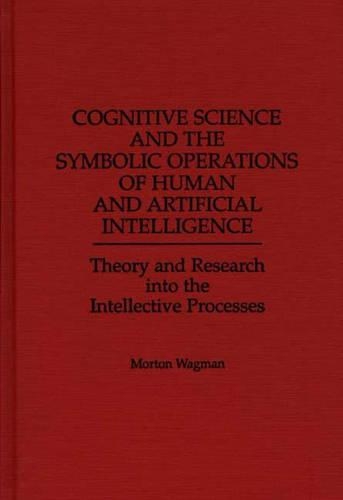
Cognitive Science and the Symbolic Operations of Human and Artificial Intelligence: Theory and Research into the Intellective Processes
(Hardback)
Publishing Details
Cognitive Science and the Symbolic Operations of Human and Artificial Intelligence: Theory and Research into the Intellective Processes
By (Author) Morton Wagman
Bloomsbury Publishing PLC
Praeger Publishers Inc
30th September 1997
United States
Classifications
Tertiary Education
Non Fiction
Artificial intelligence (AI)
153
Physical Properties
Hardback
192
Description
This scholarly book presents and critically evaluates the outstanding contributions of both cognitive psychology and artificial intelligence to our understanding of the nature of intelligence and intelligent systems. Examining conceptual thought across the domains of reasoning and logic, language and analogy, and scientific discovery, Wagman compares human reasoning with computer reasoning. Of special interest to readers is the general critique of artificial intelligence research directed toward the ultimate objective of mapping and surpassing all of human knowledge. The first chapter examines the theoretical foundations of the logical approach to artificial intelligence and the centrality of declarative knowledge and the predicate calculus. The artifical intelligence system, CYC, is critically examined with respect to its avowed objective of matching or surpassing human intelligence. The second chapter focuses on the probabilistic contrast model of causal reasoning and underscores its significance as a mathematical conceptualization of human reasoning. In the third chapter, the ARCS (Analogical Retrieval by Constraint Satisfaction) system is discussed and its psychological validity is evaluated. In the fourth chapter, scientific heuristics characteristics of different developmental levels and differentially applied in the discovery spaces of hypotheses and experiments are analyzed in the context of the philosophy of science. The fifth chapter presents the logic, principles, and applications of PAULINE, a pragmatic language generation system and explains human language pragmatics.
Author Bio
MORTON WAGMAN is Professor Emeritus of Psychology at the University of Illinois at Urbana-Champaign and is a Diplomate in Counseling Psychology, American Board of Professional Psychology. He was honored as Distinguished Psychologist by the American Psychological Association in 1990. His most recent books include: The General Unified Theory of Intelligence (1997), Human Intellect and Cognitive Science (1996), The Sciences of Cognition (1995), Cognitive Psychology and Artifical Intelligence (1993), Cognitive Science and Concepts of Mind (1991), Artificial Intelligence and Human Cognition (1991), and The Dilemma and the Computer (1984), all published by Praeger.
